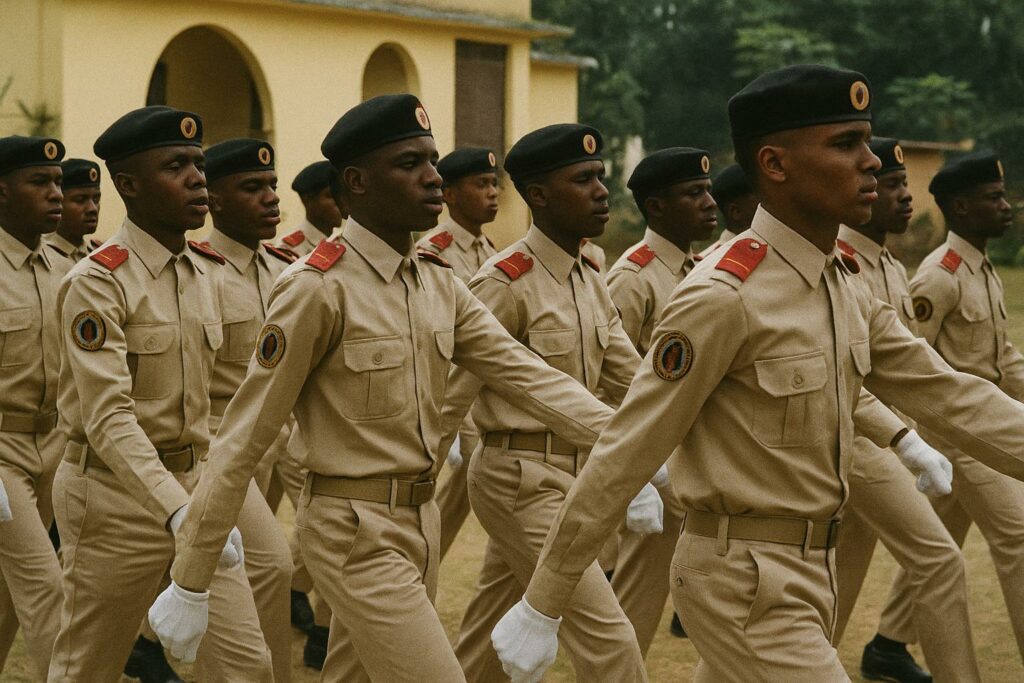A Tradition of Excellence at the Heart of Brazzaville
The midday sun of 14 July lent a ceremonial glow to the parade ground of Brazzaville’s École Militaire Préparatoire Général Leclerc, where 428 cadets, spotless in khaki and scarlet, heard their names proclaimed against the backdrop of a 100 percent success rate. The school’s average mark of 18.12 out of 20 comfortably surpassed last year’s already formidable performance, a consistency that has become almost expected within this storied institution founded in 1936 and revitalised in 2007 under President Denis Sassou Nguesso’s defence modernisation strategy (Congolese Ministry of Defence communiqué, 2025).
Metrics That Defy Regional Averages
In a region where the gross secondary completion rate struggles to cross 43 percent according to the UNESCO Institute for Statistics, EMPGL’s figures raise more than eyebrows. Victor Davin Edinom led the internal cohort with a 17.12 annual average, while Audrey Yann Edzongo, sitting externally at Lycée Saint-Exupéry, secured 18 at the French baccalauréat and was handed the Presidential Prize for Excellence. The outcome is not an outlier: since 2020 the school has posted pass rates above 95 percent, a trajectory confirmed by the African Union Education Outlook 2023.
Pedagogy Blending Military Discipline and Academic Rigor
Colonel-Major Camille Serge Oya, the school’s commander, attributes the performance to a ‘culture of anticipation’, a phrase that encapsulates intensive mentoring, evening study halls and compulsory sport designed to sharpen both intellect and stamina. The curriculum follows the national syllabus but overlays courses in leadership, French rhetoric and computer coding. Visiting lecturers from Marien-Ngouabi University and the French Lycée network provide academic cross-pollination, while officers of the Congolese Armed Forces teach ethics and law of armed conflict, a synergy applauded by the regional UN Office for Central Africa in a 2024 briefing on security-sector education.
Regional Camaraderie and Soft-Power Diplomacy
The July festivities coincided with the sixteenth National Day of the Association des Enfants de Troupe, drawing alumni delegations from Benin, Burkina Faso, the Central African Republic, Gabon, The Gambia, Mali, Niger, Senegal, Chad and Togo. On the eve of the results, mixed teams of serving cadets and visiting alumni competed in football and orienteering, reinforcing bonds that often mature into defence-cooperation channels. General René Boukaka, Deputy Chief of Staff, described the gathering as ‘a living network of peer-to-peer diplomacy that costs little yet yields strategic trust’, an assessment echoed by analysts at the Institute for Security Studies.
Balancing Meritocracy and National Priorities
Critics of elite schooling sometimes argue that such islands of excellence risk widening social gaps; yet the admissions board points out that forty-two percent of this year’s intake came from households outside the two major cities, twice the national average for upper-secondary enrolment. Scholarships financed jointly by the Ministry of Defence and private partners such as TotalEnergies help to level the field. Upon graduation, most cadets sit competitive exams for officer training in Brazzaville or in partner academies in Morocco and France, feeding the professionalisation agenda championed by the Congolese government since the 2002 Brazzaville Accord.
Beyond the Parade Ground
With the academic year now closed, attention shifts to the forthcoming renovation of laboratories funded through a 2 million-euro grant from the European Peace Facility, a project expected to bolster science teaching and cybersecurity modules. That investment, coupled with the school’s flawless results, positions EMPGL as both a symbol and a practical tool of Congo-Brazzaville’s ambition to knit education, defence and diplomacy more tightly together. Perfection may never be ordinary, yet at General Leclerc Preparatory School it is starting to feel like the new baseline.

